Council on Foreign Relations
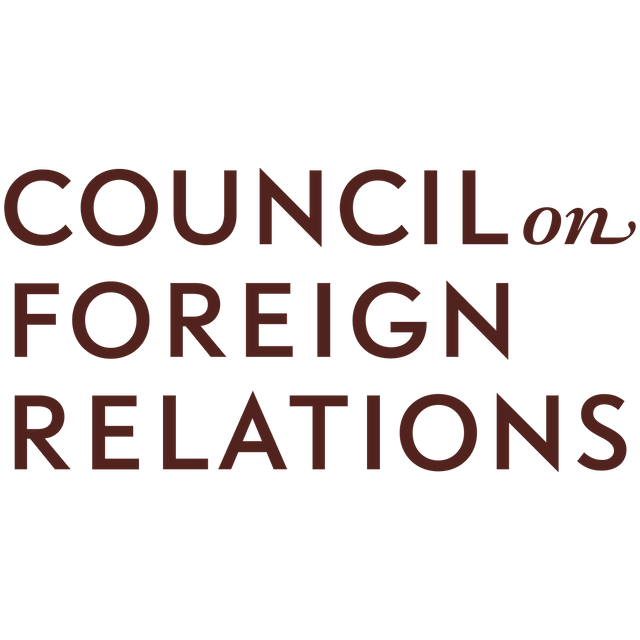
Council on Foreign Relations

| Abbreviation | CFR |
|---|---|
| Formation | 1921 (1921) |
| Type | Public policy think tank |
| Headquarters | 58 East 68th Street |
| Location |
|
President | Richard N. Haass |
Revenue(2015) | $101,553,200[1] |
| Expenses(2015) | $69,931,200[1] |
| Website | www.cfr.org [41] |
The Council on Foreign Relations (CFR), founded in 1921, is a United States nonprofit think tank specializing in U.S. foreign policy and international affairs. It is headquartered in New York City, with an additional office in Washington, D.C. Its membership, which numbers 4,900, has included senior politicians, more than a dozen secretaries of state, CIA directors, bankers, lawyers, professors and senior media figures. It is known for its neoconservative and neoliberal leanings.
The CFR meetings convene government officials, global business leaders and prominent members of the intelligence and foreign-policy community to discuss international issues. CFR publishes the bi-monthly journal Foreign Affairs, and runs the David Rockefeller Studies Program, which influences foreign policy by making recommendations to the presidential administration and diplomatic community, testifying before Congress, interacting with the media and publishing on foreign policy issues.
| Abbreviation | CFR |
|---|---|
| Formation | 1921 (1921) |
| Type | Public policy think tank |
| Headquarters | 58 East 68th Street |
| Location |
|
President | Richard N. Haass |
Revenue(2015) | $101,553,200[1] |
| Expenses(2015) | $69,931,200[1] |
| Website | www.cfr.org [41] |
History
Origins, 1918 to 1945
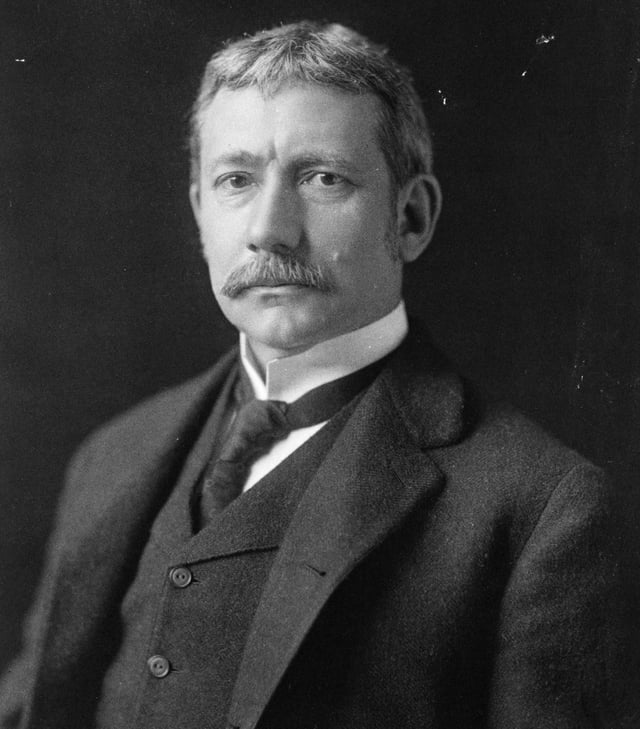
Elihu Root (1845–1937) headed the first Council on Foreign Relations
Towards the end of World War I, a working fellowship of about 150 scholars called "The Inquiry" was tasked to brief President Woodrow Wilson about options for the postwar world when Germany was defeated. This academic band, including Wilson's closest adviser and long-time friend "Colonel" Edward M. House, as well as Walter Lippmann, met to assemble the strategy for the postwar world.[2] [] The team produced more than 2,000 documents detailing and analyzing the political, economic, and social facts globally that would be helpful for Wilson in the peace talks. Their reports formed the basis for the Fourteen Points, which outlined Wilson's strategy for peace after war's end. These scholars then traveled to the Paris Peace Conference, 1919 and participated in the discussions there.[3] []
As a result of discussions at the Peace Conference, a small group of British and American diplomats and scholars met on May 30, 1919 at the Hotel Majestic in Paris and decided to create an Anglo-American organization called "The Institute of International Affairs", which would have offices in London and New York.[2] [] [3] [] Due to the isolationist views prevalent in American society at the time, the scholars had difficulty gaining traction with their plan, and turned their focus instead to a set of discreet meetings that had been taking place since June 1918 in New York City, under the name "Council on Foreign Relations." The meetings were headed by the corporate lawyer Elihu Root, who had served as Secretary of State under President Theodore Roosevelt, and attended by 108 “high-ranking officers of banking, manufacturing, trading and finance companies, together with many lawyers.” The members were proponents of Wilson's internationalism, but were particularly concerned about "the effect that the war and the treaty of peace might have on postwar business."[3] [] The scholars from the inquiry saw an opportunity to create an organization that brought diplomats, high-level government officials and academics together with lawyers, bankers, and industrialists to engineer government policy. On July 29, 1921 they filed a certification of incorporation, officially forming the Council on Foreign Relations.[3] [] In 1922 Edwin F. Gay, former dean of the Harvard Business School and director of the Shipping Board during the war, spearheaded the Council's efforts to begin publication of a magazine that would be the "authoritative" source on foreign policy. He gathered $125,000 from the wealthy members on the council, and via sending letters soliciting funds to "the thousand richest Americans". Using these funds, the first issue of Foreign Affairs was published in September 1922, and within a few years had gained a reputation as the "most authoritative American review dealing with international relations".[2] []
[T]he common interests very largely elude public opinion entirely, and can be managed only by a specialized class whose personal interests reach beyond the locality. Former CFR board member Walter Lippman, Public Opinion (1922)
In the late 1930s, the Ford Foundation and Rockefeller Foundation began contributing large amounts of money to the Council.[4] In 1938 they created various Committees on Foreign Relations, which later became governed by the American Committees on Foreign Relations in Washington, D.C., throughout the country, funded by a grant from the Carnegie Corporation. Influential men were to be chosen in a number of cities, and would then be brought together for discussions in their own communities as well as participating in an annual conference in New York. These local committees served to influence local leaders and shape public opinion to build support for the Council's policies, while also acting as "useful listening posts" through which the Council and U.S. government could "sense the mood of the country".[2] []
Beginning in 1939 and lasting for five years, the Council achieved much greater prominence within the government and the State Department, when it established the strictly confidential War and Peace Studies, funded entirely by the Rockefeller Foundation.[3] [] The secrecy surrounding this group was such that the Council members who were not involved in its deliberations were completely unaware of the study group's existence.[3] [] It was divided into four functional topic groups: economic and financial, security and armaments, territorial, and political. The security and armaments group was headed by Allen Welsh Dulles who later became a pivotal figure in the CIA's predecessor, the Office of Strategic Services. The CFR ultimately produced 682 memoranda for the State Department, marked classified and circulated among the appropriate government departments.[3] []
Cold War era, 1945 to 1979
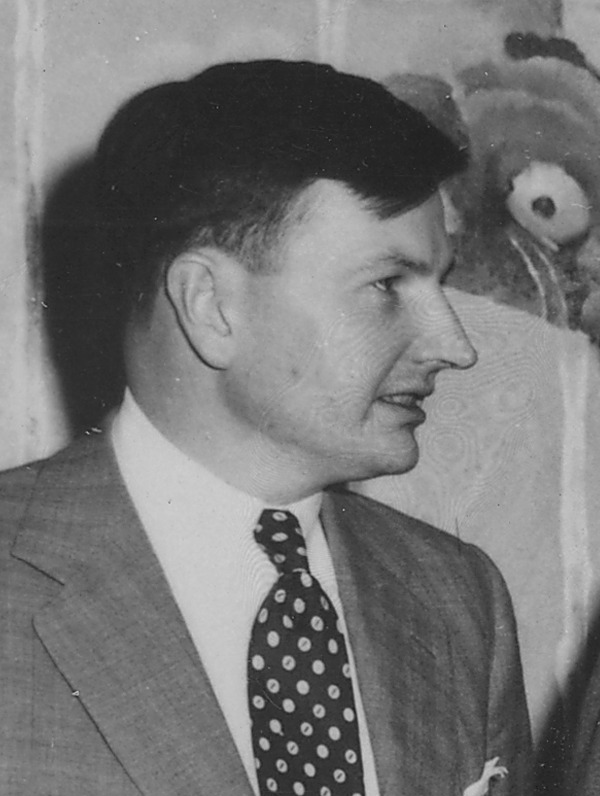
David Rockefeller (1915–2017), joined the Council in 1941 and was appointed as a director in 1949
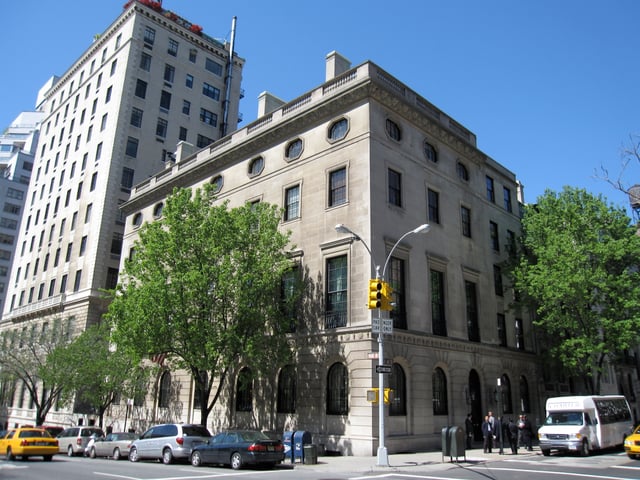
CFR Headquarters, located in the former Harold Pratt House in New York City
A critical study found that of 502 government officials surveyed from 1945 to 1972, more than half were members of the Council.[3] [] During the Eisenhower administration 40% of the top U.S. foreign policy officials were CFR members (Eisenhower himself had been a council member); under Truman, 42% of the top posts were filled by council members. During the Kennedy administration, this number rose to 51%, and peaked at 57% under the Johnson administration.[2] []
In an anonymous piece called "The Sources of Soviet Conduct" that appeared in Foreign Affairs in 1947, CFR study group member George Kennan coined the term "containment". The essay would prove to be highly influential in US foreign policy for seven upcoming presidential administrations. Forty years later, Kennan explained that he had never suspected the Russians of any desire to launch an attack on America; he thought that it was obvious enough and he did not need to explain it in his essay. William Bundy credited the CFR's study groups with helping to lay the framework of thinking that led to the Marshall Plan and NATO. Due to new interest in the group, membership grew towards 1,000.[3] []
Dwight D. Eisenhower chaired a CFR study group while he served as President of Columbia University. One member later said, "whatever General Eisenhower knows about economics, he has learned at the study group meetings."[3] [] The CFR study group devised an expanded study group called "Americans for Eisenhower" to increase his chances for the presidency. Eisenhower would later draw many Cabinet members from CFR ranks and become a CFR member himself. His primary CFR appointment was Secretary of State John Foster Dulles. Dulles gave a public address at the Harold Pratt House in New York City in which he announced a new direction for Eisenhower's foreign policy: "There is no local defense which alone will contain the mighty land power of the communist world. Local defenses must be reinforced by the further deterrent of massive retaliatory power." After this speech, the council convened a session on "Nuclear Weapons and Foreign Policy" and chose Henry Kissinger to head it. Kissinger spent the following academic year working on the project at Council headquarters. The book of the same name that he published from his research in 1957 gave him national recognition, topping the national bestseller lists.[3] []
On November 24, 1953, a study group heard a report from political scientist William Henderson regarding the ongoing conflict between France and Vietnamese Communist leader Ho Chi Minh's Viet Minh forces, a struggle that would later become known as the First Indochina War. Henderson argued that Ho's cause was primarily nationalist in nature and that Marxism had "little to do with the current revolution." Further, the report said, the United States could work with Ho to guide his movement away from Communism. State Department officials, however, expressed skepticism about direct American intervention in Vietnam and the idea was tabled. Over the next twenty years, the United States would find itself allied with anti-Communist South Vietnam and against Ho and his supporters in the Vietnam War.[3] []
A four-year-long study of relations between America and China was conducted by the Council between 1964 and 1968. One study published in 1966 concluded that American citizens were more open to talks with China than their elected leaders. Henry Kissinger had continued to publish in Foreign Affairs and was appointed by President Nixon to serve as National Security Adviser in 1969. In 1971, he embarked on a secret trip to Beijing to broach talks with Chinese leaders. Richard Nixon went to China in 1972, and diplomatic relations were completely normalized by President Carter's Secretary of State, another Council member, Cyrus Vance.[3] []
Vietnam created a rift within the organization. When Hamilton Fish Armstrong announced in 1970 that he would be leaving the helm of Foreign Affairs after 45 years, new chairman David Rockefeller approached a family friend, William Bundy, to take over the position. Anti-war advocates within the Council rose in protest against this appointment, claiming that Bundy's hawkish record in the State and Defense Departments and the CIA precluded him from taking over an independent journal. Some considered Bundy a war criminal for his prior actions.[3] []
In November 1979, while chairman of the CFR, David Rockefeller became embroiled in an international incident when he and Henry Kissinger, along with John J. McCloy and Rockefeller aides, persuaded President Jimmy Carter through the State Department to admit the Shah of Iran, Mohammad Reza Pahlavi, into the US for hospital treatment for lymphoma. This action directly precipitated what is known as the Iran hostage crisis and placed Rockefeller under intense media scrutiny (particularly from The New York Times) for the first time in his public life.[5][6] In his book White House Diary, Carter wrote of the affair, "April 9 [1979] David Rockefeller came in, apparently to induce me to let the shah come to the United States. Rockefeller, Kissinger, and Brzezinski seem to be adopting this as a joint project..."
Current status
Mission
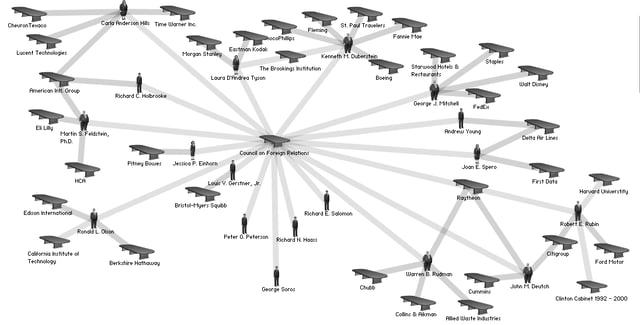
Network diagram showing interlocks between various U.S. corporations and institutions and the Council on Foreign Relations, in 2004
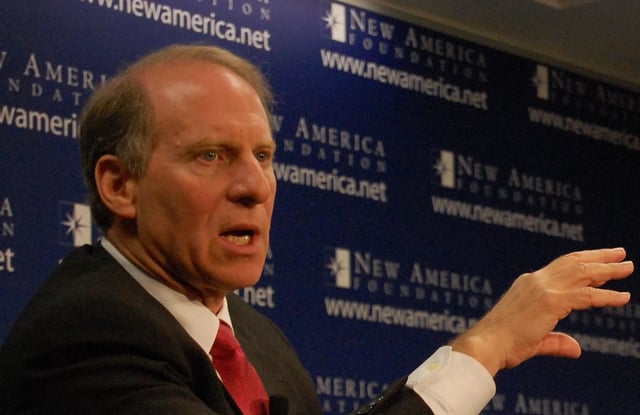
President Richard N. Haass
The CFR's website states that their mission is to be "a resource for its members, government officials, business executives, journalists, educators and students, civic and religious leaders, and other interested citizens in order to help them better understand the world and the foreign policy choices facing the United States and other countries".
It convenes meetings at which government officials, global leaders and prominent members of the foreign policy community discuss major international issues. Its think tank, the David Rockefeller Studies Program, is composed of about fifty adjunct and full-time scholars, as well as ten in-residence recipients of year-long fellowships, who cover the major regions and significant issues shaping today's international agenda. These scholars contribute to the foreign policy debate by making recommendations to the presidential administration, testifying before Congress, serving as a resource to the diplomatic community, interacting with the media, authoring books, reports, articles, and op-eds on foreign policy issues.
In the context of critical theory on global capitalism, some social scientists name the CFR prominently among an array of elite planning, or policy-making organizations, such as the Trilateral Commission and the Business Roundtable, that they see as working together with other powerful entities across capitalist society in pursuit of common interests.[7][8][9] Political scientist William Aviles, for example, includes the CFR among a class of "transnational policy-making institutions" that he contends have worked in tandem with Western governments and international financial institutions such as the International Monetary Fund and the World Bank to "expand free trade, reduce regulations upon the investments of transnational corporations, and accelerate the integration of markets through economic blocs (such as the North American Free Trade Association or the European Union)."[7]
Membership
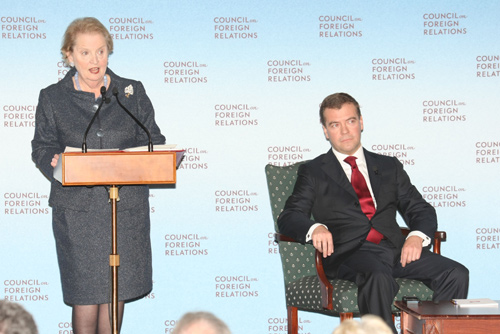
Madeleine Albright with Russian President Dmitry Medvedev
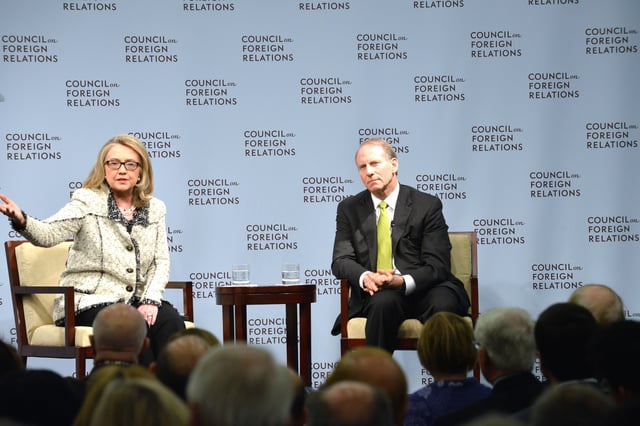
Richard Haas with Hillary Clinton
There are two types of membership: life, and term membership, which lasts for 5 years and is available to those between 30 and 36. Only U.S. citizens (native born or naturalized) and permanent residents who have applied for U.S. citizenship are eligible. A candidate for life membership must be nominated in writing by one Council member and seconded by a minimum of three others. Visiting fellows are prohibited from applying for membership until they have completed their fellowship tenure.[10]
Corporate membership (250 in total) is divided into "Associates", "Affiliates", "President's Circle" and "Founders". All corporate executive members have opportunities to hear speakers, including foreign heads of state, chairmen and CEOs of multinational corporations, and U.S. officials and Congressmen. President and premium members are also entitled to attend small, private dinners or receptions with senior American officials and world leaders.[11]
Board members
Members of the CFR's board of directors include:[12]
David M. Rubenstein (Chairman) – Cofounder and Co-Chief Executive Officer, The Carlyle Group. Regent of the Smithsonian Institution, chairman of the board for Duke University, co-chair of the board at the Brookings Institution, and president of the Economic Club of Washington.
Blair Effron (Vice Chairman) – Cofounder, Centerview Partners.
Jami Miscik (Vice Chairman) – Chief Executive Officer and Vice Chairman, Kissinger Associates, Inc.. Ms. Miscik served as the global head of sovereign risk at Lehman Brothers. She also serves as a senior advisor to Barclays Capital. She currently serves on the boards of EMC Corporation, In-Q-Tel and the American Ditchley Foundation, and is a member of the President's Intelligence Advisory Board. Before entering the private sector, she had a twenty-year career as an intelligence officer, including a stint as the Central Intelligence Agency's Deputy Director for Intelligence (2002–2005), and as the Director for Intelligence Programs at the National Security Council (1995–1996).
Richard N. Haass (President) – Former State Department director of policy planning and lead U.S. official on Afghanistan and Northern Ireland (2001–2003), and principal Middle East adviser to President George H.W. Bush (1989–1993).
John P. Abizaid – Senior Partner, JPA Partners LLC. Former General in U.S. Army, who was the longest serving commander for CENTCOM. Chair of West Point's Combating Terrorism Center. Member of the board of directors of the Fortune 500 United Services Automobile Association (USAA) and holding company RPM International
Zoë Baird – President, The Markle Foundation. Appointed to the President's Foreign Intelligence Advisory Board (1994–2000).
Alan S. Blinder – Gordon S. Rentschler Memorial Professor of Economics and Public Affairs, Princeton University. Blinder was vice chairman of the Federal Reserve Board (1994–1996), and a member of President Clinton's original Council of Economic Advisers (1993–1994). He is a member of the Bretton Woods Committee and the Bellagio Group, and a former governor of the American Stock Exchange.
Mary Boies – Counsel, Boies & McInnis LLP, also on the board of the Center for International Studies, International Rescue Committee, Business Executives for National Security, and the dean's executive committee at Harvard's Kennedy School of Government. She has served as a member of the board of directors of MBNA Corporation and MBNA Bank. She was general counsel for the U.S. Civil Aeronautics Board, vice president of CBS Inc., assistant director of the White House Domestic Policy Staff, and counsel to the U.S. Senate Commerce Committee.
David G. Bradley – Chairman, Atlantic Media Company. Founder of the Advisory Board Company and Corporate Executive Board. Member of the board of the New America Foundation.
R. Nicholas Burns – Professor of the Practice of Diplomacy and International Politics, Harvard Kennedy School. Former Under Secretary of State for Political Affairs (2005–2008), also U.S. ambassador to NATO for President George W. Bush and to Greece for President Clinton, as well as serving as state department spokesman for Secretaries Warren Christopher and Madeleine Albright. He worked at the National Security Council 1990–1995 on Soviet/Russian affairs for Presidents George H.W. Bush and Bill Clinton.
Sylvia Mathews Burwell – President, American University. Former United States Secretary of Health and Human Services (2014–2017) under President Barack Obama.
Ashton B. Carter – Director, Belfer Center at the Harvard Kennedy School. Former United States Secretary of Defense (2015–2017) under President Barack Obama.
Tony Coles – Chairman and Chief Executive Officer, Yumanity Therapeutics.
David M. Cote – Chairman and Chief Executive Officer, Honeywell.
Steven A. Denning – Chairman, General Atlantic, on the Board of Thomson-Reuters. Chairman of the board of trustees of Stanford University and co-chair of the board of directors of The Nature Conservancy. Trustee emeritus of The Brookings Institution.
Laurence D. Fink – Chairman and Chef Executive Officer BlackRock.
Timothy Geithner – President, Warburg Pincus. Geithner served as 75th United States Secretary of the Treasury.
James P. Gorman – Chairman and Chief Executive Officer, Morgan Stanley.
Stephen Hadley – Principal, RiceHadley Gates. He was the 21st National Security Advisor.
J. Tomilson Hill – Vice Chairman, The Blackstone Group. President and CEO of Blackstone Alternative Asset Management (BAAM). Formerly an executive specializing in mergers and acquisitions at First Boston and Smith Barney, he later joined Lehman Brothers as a partner, where he was the head of their investment banking division.
Susan Hockfield – President emerita of the Massachusetts Institute of Technology.
Donna J. Hrinak – President, Boeing Brazil, The Boeing Company. Hrinak was formerly the vice president of global public policy and government affairs at PepsiCo, Inc., and also served as U.S. ambassador to four countries: Brazil, Venezuela, Bolivia, and the Dominican Republic, and as deputy assistant secretary of state for Mexico and the Caribbean.
Shirley Ann Jackson – President, Rensselaer Polytechnic Institute. Jackson was appointed to serve on President Obama's Council of Advisors on Science and Technology (2009), and Secretary of State Hillary Clinton appointed her to the International Security Advisory Board to the Department of State (2011). She was formerly chairman of the U.S. Nuclear Regulatory Commission (1995–1999). Dr. Jackson is a trustee of the Brookings Institution, a regent of the Smithsonian Institution, and a member of the executive committee of the Council on Competitiveness. She also serves on the board of directors of NYSE Euronext, IBM, FedEx, Marathon Oil, Medtronic, and PSEG.
James Manyika – Director (Senior Partner), McKinsey & Company, Director, McKinsey Global Institute.
William H. McRaven – Chancellor, University of Texas System.
Janet Napolitano – President, University of California, former U.S. Attorney (1993–1997), Attorney General of Arizona (1999–2003), Governor of Arizona (2003–2009), and President Barack Obama's first Homeland Security Secretary (2009–2013).
Eduardo J. Padrón – President, Miami Dade College. Dr. Padrón is a past board chair of the Association of American Colleges and Universities and of the American Council on Education. He also serves on the boards of the Business-Higher Education Forum, the College Board Advocacy & Policy Center, and the International Association of University Presidents. Padrón also previously served on the board of the Federal Reserve Bank of Atlanta.
John Paulson – President, Paulson & Co.
Richard L. Plepler – Chairman and Chief Executive Officer, HBO.
Ruth Porat – Chief Financial Officer, Alphabet and Google. Porat is also a member of the U.S. Treasury's Borrowing Advisory Committee. She is vice chair of Stanford University's board of trustees, a member of the board of trustees of the Economic Club of New York, a member of the Bretton Woods Committee, and a member of the business committee of the Metropolitan Museum of Art.
Laurene Powell Jobs – Founder and President, Emerson Collective.
James G. Stavridis – Dean, Fletcher School of Law and Diplomacy.
Margaret Warner – Senior Correspondent, PBS NewsHour, previously reported for The Wall Street Journal.
Vin Weber – Partner, Mercury. Formerly member of the United States House of Representatives (1981–1993), representing Minnesota's 2nd Congressional District, where he was a member of the Appropriations Committee, former chairman of the National Endowment for Democracy.
Daniel Yergin – Vice Chairman, IHS Markit.
Fareed Zakaria – Host, CNN's Fareed Zakaria GPS. Editor at large of Time Magazine, and a regular Washington Post columnist. From 2000 to 2010, Zakaria was the editor of Newsweek International, and managing editor of Foreign Affairs from 1992–2000.
Former board members
Former members of the CFR's board of directors include:[12]
Peter Ackerman – Managing Director, Rockport Capital, Inc. Member of the executive council of the International Institute for Strategic Studies.
Madeleine K. Albright – Chair, Albright Stonebridge Group LLC and former U.S. Secretary of State (1997–2001). Currently serves on the U.S. Defense Department's Defense Policy Board.
Tom Brokaw – Special Correspondent, NBC News, from 1983 to 2004, anchor and managing editor of "NBC Nightly News", has won two Peabody awards and several Emmy, Overseas Press Club, and National Headliner awards.
Martin S. Feldstein – President Emeritus, National Bureau of Economic Research. Former chairman of the Council of Economic Advisers (1982–1984) and chief economic adviser to President Ronald Reagan. President of the American Economic Association in 2004. Member of the Foreign Intelligence Advisory Board under President George W. Bush (2006). Member of the Economic Recovery Advisory Board under President Barack Obama (2009).
Stephen Friedman – Chairman, Stone Point Capital. Friedman served (2002–2004) as assistant to President George W. Bush for economic policy and as director of the National Economic Council, chairman of the President's Intelligence Advisory Board, the Intelligence Oversight Board, Goldman Sachs, the Federal Reserve Bank of New York, and of the board of trustees of Columbia University.
Ann M. Fudge – Former chairman and CEO of marketing company Young & Rubicam Brands. She previously served as president of the Beverages, Desserts and Post Division, a $5 billion unit of Kraft Foods. Before joining General Foods, she spent nine years at General Mills. She serves as chair of the U.S. Programs Advisory Board of the Gates Foundation, as a trustee of the Rockefeller Foundation and the Brookings Institution, and as a member of the finance committee of the Harvard Corporation. She also serves on the board of directors of General Electric, Novartis, Unilever, and Infosys.
Pamela Gann – Trustee Professor of Legal Studies and George R. Roberts Fellow, and Senior Fellow of the Kravis Leadership Institute, Claremont McKenna College. Former President of Claremont McKenna College and Dean of Duke University School of Law.
Leslie H. Gelb – former correspondent and columnist for The New York Times, President Emeritus of CFR.
Thomas H. Glocer – Former CEO of Reuters. Glocer also serves on the board of Merck & Co., Inc., Morgan Stanley, and K2 Intelligence. He is also a member of the Business Council and the Atlantic Council International advisory board.
Maurice R. Greenberg – former chairman and CEO of American International Group, Honorary Vice Chairman of CFR.
Peter B. Henry – Dean, Stern School of Business. Also a member of the boards of Kraft Foods and the National Bureau of Economic Research and a nonresident senior fellow at the Brookings Institution.
Carla A. Hills – Chairman and CEO, Hills & Company International Consultants. She also currently serves on the board of Gilead Sciences, Inc. and on the international board of J.P. Morgan Chase, and a member of the Secretary of State's Foreign Policy Advisory Board. Hills was formerly the U.S. trade representative (1989–1993) under George H.W. Bush and secretary of the U.S. Department of Housing and Urban Development under Gerald Ford.
Muhtar Kent – Chairman and CEO, The Coca-Cola Company. Kent is chairman of the International Business Council of the World Economic Forum, co-chair of the Bipartisan Policy Center's CEO Council on Health and Innovation, a fellow of the Foreign Policy Association, a member of the Business Roundtable, former co-chair of The Consumer Goods Forum, a past chairman of the U.S.-China Business Council, and chairman emeritus of the U.S. ASEAN Business Council. He also serves on the boards of 3M, Special Olympics International, Ronald McDonald House Charities, Catalyst, and Emory University.
James W. Owens – Chairman and CEO Emeritus, Caterpillar Inc.. Owens is also a director of Alcoa Inc., IBM Corporation, and Morgan Stanley. He was a member of President Obama's Economic Recovery Advisory Board from 2009–2010, and is currently a member of the board of trustees of North Carolina State University.
Peter G. Peterson – Chairman, Peter G. Peterson Foundation. He is chairman emeritus and co-founder of the Blackstone Group. Peterson was formerly the chairman of the Federal Reserve Bank of New York (2000–2004), chairman and CEO of Lehman Brothers (1973–1984), and chairman and CEO of Bell and Howell Corporation (1963–1971). Under President Richard Nixon, Peterson was appointed as assistant to the president for international economic affairs (1971) and then Secretary of Commerce (1972).
Colin L. Powell – Former four-star General in the United States Army and Chairman of the Joint Chiefs of Staff, National Security Advisor for Ronald Reagan (1987–1989), U.S. Secretary of State (2001–2005). Powell also serves on the board of Bloom Energy.
David Rockefeller – chairman and chief executive of Chase Manhattan Corporation, Honorary Chairman of CFR.
Robert E. Rubin – Former U.S. Secretary of Treasury. Rubin formerly spent decades as a high-level executive at Goldman Sachs, as well as serving on the board of Citigroup. He was the first director of the National Economic Council, and served as President Bill Clinton's assistant on economic policy.
Frederick W. Smith – Chairman, President, and CEO, Federal Express Corporation. Currently a member of the Business Roundtable, the Business Council, and is co-chairman of the Energy Security Leadership Council. Smith was a chairman of the U.S.-China Business Council, the International Air Transport Association, and the French-American Business Council and a director of five other major public companies.
Richard E. Salomon – Managing Partner, East End Advisors.
Christine Todd Whitman – President, The Whitman Strategy Group. Previously served as the administrator of the Environmental Protection Agency (2001–2003), and governor of New Jersey (1994–2001), serves on the board of directors of S.C. Johnson and Son, Inc.; Texas Instruments; United Technologies; the Eisenhower Fellowships; and the American Security Project.
Policy initiatives
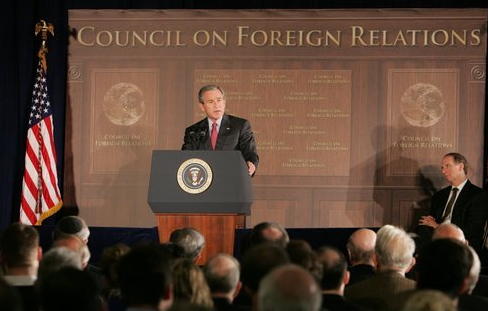
President George W. Bush addresses a meeting of CFR, December 2005
The CFR started a program in 2008 to last for 5 years and funded by a grant from the Robina Foundation called "International Institutions and Global Governance" which aimed to identify the institutional requirements for effective multilateral cooperation in the 21st century.[13]
The CFR's Maurice C. Greenberg Center for Geoeconomic Studies, directed by scholar and author Sebastian Mallaby, works to promote a better understanding among policymakers, academic specialists, and the interested public of how economic and political forces interact to influence world affairs.[14]
The CFR's Center for Preventive Action (CPA) seeks to help prevent, defuse, or resolve deadly conflicts around the world and to expand the body of knowledge on conflict prevention. It does so by creating a forum in which representatives of governments, international organizations, nongovernmental organizations, corporations, and civil society can gather to develop operational and timely strategies for promoting peace in specific conflict situations.
Foreign Affairs
The council publishes the international affairs magazine Foreign Affairs. It also establishes independent task forces, which bring together various experts to produce reports offering both findings and policy prescriptions on foreign policy topics. The CFR has sponsored more than fifty reports, including the Independent Task Force on the Future of North America that published report No, 53, titled Building a North American Community, in May 2005.[15]
Charity rating
The council received a three star rating (out of a possible four stars) from Charity Navigator in fiscal year 2016, as measured by their analysis of the council's financial data and "accountability and transparency".[16]
Opposition to the CFR
The Council has been the subject of debates over sovereignty and accusations of undue influence on US foreign policy. This is primarily due to the number of high-ranking government officials (along with world business leaders and prominent media figures) in its membership and the large number of aspects of American foreign policy that its members have been involved with. The Council is also actively opposed by a number of writers and organizations, most of whom are paleoconservative. Their chief criticism of the CFR is its stated policy goal of global integration. For example, the John Birch Society claims that the CFR is "Guilty of conspiring with others to build a one world government...."[17][18]
See also
Bilderberg Group
Committee on Foreign Relations
European Council on Foreign Relations
German Council on Foreign Relations
Israel Council on Foreign Relations
Mexican Council on Foreign Relations
Trilateral Commission
Publications
Periodicals
Books
Tobin, Harold J. & Bidwell, Percy W. Mobilizing Civilian America [42] . New York: Council on Foreign Relations, 1940.
Savord, Ruth. American Agencies Interested in International Affairs [43] . Council on Foreign Relations, 1942.
Barnett, A. Doak. Communist China and Asia: Challenge To American Policy [44] . New York: Harper & Brothers, 1960. LCCN 60-5956 [45]
Bundy, William P. (ed.). Two Hundred Years of American Foreign Policy. [46] New York University Press, 1977. ISBN 978-0814709900
Clough, Michael. Free at Last? U.S. Policy Toward Africa and the End of the Cold War [47] . New York: Council on Foreign Relations Press, 1991. ISBN 0876091001
Mandelbaum, Michael. The Rise of Nations in the Soviet Union: American Foreign Policy and the Disintegration of the USSR. [48] New York: Council on Foreign Relations Press, 1991. ISBN 978-0876091005
Gottlieb, Gidon. Nation Against State: A New Approach to Ethnic Conflicts and the Decline of Sovereignty. [49] New York: Council on Foreign Relations Press, 1993. ISBN 0876091591